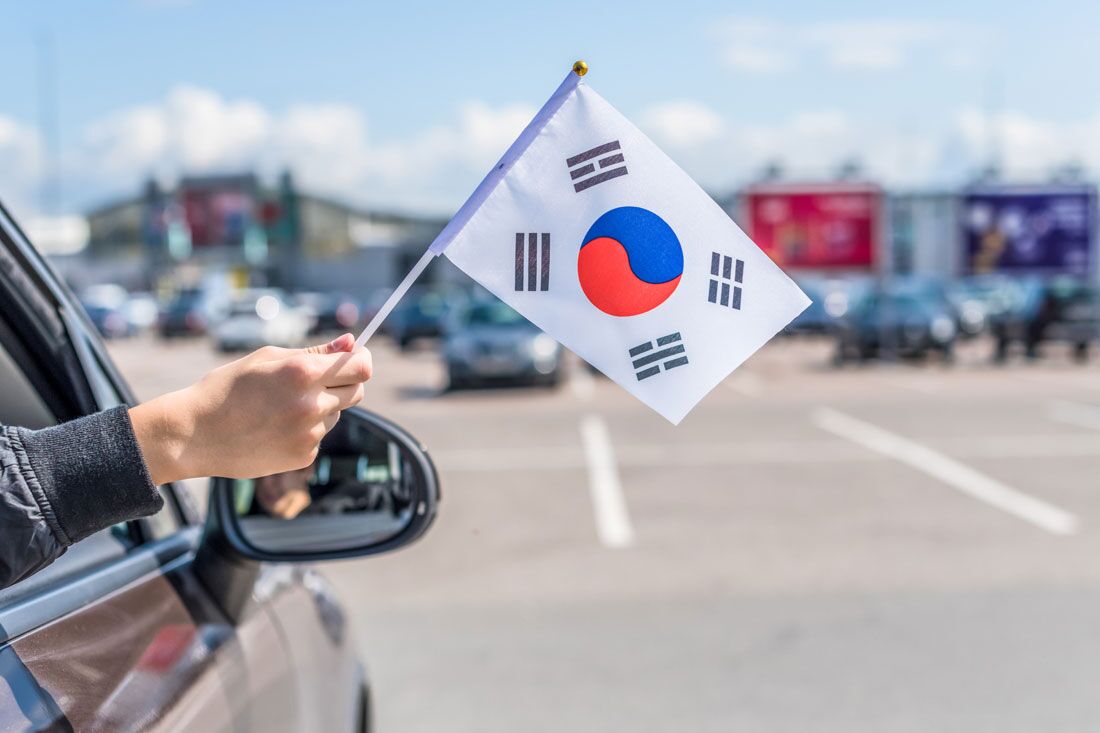Steeped in tradition, while producing world-first technology and innovations, South Korea truly offers something for everyone. Home to tech heavyweights like Samsung and LG, South Korea is ideal for expats working in IT, finance and electronics. Also, boasting the world’s fastest internet connection, Aussie expats can stay in touch with friends and family back home. If you’re ready to experience this marriage of history and future, this article covers South Korea’s:
- Tax residency rules
- Taxation rates
- The Australian-South Korean tax treaty
- Social security, and more.
Who is a resident of South Korea?
The percentage of tax you pay in South Korea entirely depends on whether you are classified as a resident or non-resident.
South Korean resident
To be considered a South Korean resident for tax purposes, you must satisfy at least one of these four criteria. If you:
- Have a “domicile” in South Korea or have resided there for 183 consecutive days or more;
- Have a job which requires you to reside in South Korea for 183 days or more,
- Are staying with family members in South Korea for 183 straight days or more, or;
- Have significant assets in South Korea.
Non-resident for tax purposes
On the other hand, the circumstances under which you may be deemed a non-resident. For example, you may be classified as a Korean resident and a resident of your home country. This puts each country’s tax rights in direct competition. If so, your primary country of residence is favoured, making you a tax resident of that country.
Do I need to lodge an Australian tax return?
When residing in South Korea, there are three tax scenarios. Which category you fall under will determine whether you are required to submit an Australian tax return.
- You’re an Australian tax resident and are taxed on your worldwide income.
- You are an Australian resident for tax purposes, in addition to being a Korean resident. As Australia has a tax treaty with Korea, the Australian taxes you have to report will be minimal to none. This means you may not have to submit an Australian tax return at all.
- You are an Australian tax resident. This means you’re only taxed in Australia on certain income categories (i.e. investments, shares, capital gains, etc.) obtained from Australian sources.
Does South Korea tax me on worldwide income?
Whether you are taxed on worldwide income depends entirely on which residency category you fall under.
Tax resident of South Korea
As a South Korean resident, you are required to pay tax on income derived from all sources (i.e. inside and outside of Korea). If you’re an expat who has lived in South Korea for more than five years in the last decade, you must pay tax on your worldwide income. However, if you’ve resided in South Korea for less than five years in a decade, you are only taxed on income earned in Korea.
Non-resident of South Korea
If you are a non-resident, you may still be taxed on your worldwide income. Any income you receive (i.e. wages, investments, etc.) outside of Korea are taxed within the country, if this money relates to services performed in Korea.
What is South Korea’s personal income tax rate?
Currently, South Korea’s personal income tax rate is 40 percent. In 2005, the tax rate was at an all-time low of 35 percent. From there, it increased incrementally to its present rate.
What is included in personal income tax?
In South Korea, several sources of income are subject to taxation. So, you are taxed on the following income streams:
- Salary
- Wages
- Royalty payments
- Pension
- Interest
- Dividends
Below are Korea’s personal income tax rates. Please note, all figures are quoted in Won:
0 – 12,000,000 (6% of income)
12,000,001 – 46,000,000 (15% of income)
46,000,001 – 88,000,000 (24% of income)
88,000,001 – 150,000,001 (35% of income)
150,000,001 – 300,000,000 (38% of income)
300,000,001 – 500,000,000 (40% of income)
500,000,001+ (42% of income)
Below are Korea’s local income tax rates. Please note, all figures are quoted in Won:
0 – 12,000,000 (0.6% of income)
12,000,001 – 46,000,000 (1.5% of income)
46,000,001 – 88,000,000 (2.4% of income)
88,000,001 – 150,000,000 (3.5% of income)
150,000,001 – 300,000,000 (3.8% of income)
300,000,001 – 500,000,000 (4% of income)
500,000,001+ (4.2% of income)
Is there an Australian-South Korean tax treaty?
Yes. In fact, the Australia-South Korea agreement is one of Australia’s longest standing tax treaties. Enacted in 1982, this agreement is designed to enforce the double taxation agreement between the two nations.
The treaty also specifies how certain forms of income (i.e. interest, dividend, salaries and wages, rent, royalty payments and more) should be taxed. As part of this agreement, Korea is obliged to limit its tax rate to 15%. Despite this, Australian residents living in South Korea are not exempt from Australian tax. Instead, Australia gives credit for tax against the Australian tax on your income.
Australia’s treaties with Korea, Norway and Italy took effect prior to being signed into law. As such, Australian residents who receive royalty or interest payments from these countries can access double taxation relief.
What is the South Korean tax year?
In South Korea, the tax year directly coincides with the calendar year. That is, the tax year begins on January 1st, and ends on December 31st.
When are tax returns due?
If you are classed as a South Korean resident with global, timber, or retirement income, or capital gains, you must lodge your return between May 1st and May 31st. Your tax return must be lodged to either the superintendent or the relevant local tax office before this deadline.
Do I file my tax return individually or jointly with my spouse?
Your personal and local income taxes are calculated on an individual basis. Therefore, you are encouraged to file a separate tax return to your spouse.
Do I/or my employer have to pay social security in South Korea?
Yes. In fact, there are four types of social security in South Korea’s comprehensive plan. These include: Employment Insurance, National Health Insurance, National Pension and Worker’s Compensation Insurance.
Employment Insurance
As an expat, your obligation to participate in this scheme wholly depends on which visa you hold. Foreign citizens who have either a D-7, D-8 or D-9 visa. Certain expats do not have to contribute, if their country has an equivalent EI scheme. Depending on your industry, you’re required to contribute between 0.9% and 1.5% to your EI fund.
National Health Insurance
Participating in the National Health Insurance scheme is compulsory for all expats earning income in South Korea. The cost of insurance premiums is equally split between employees and their employers. If you are classified a “workplace-based insured person”, premiums cost approximately 7% of your monthly wage (with employees and employers paying 3.5% each).
Worker’s Compensation Insurance
This state-run initiative covers employees in the event of workplace injury, disease or disability, and any circumstance that can result in death at work. Employers are responsible for contributing to this fund. The contribution rate can range from 0.70% to 22.5% of your total wages, depending on your industry and work environment.
Am I and/or my employer required to contribute to a pension fund?
Yes. When you work in South Korea, you and your employer are expected to make equal payments into a pension fund. The National Pension is designed to provide you with a regular income when you reach retirement age.
National Pension
If you’re classed as a “workplace-based insured person”, employees and employers must contribute 4.5% of your annual salary (for a total of 9%). Your contributions are capped KRW 4,860,000 per month and are tax-deductible. You’re required to make regular payments unless your country has a social security agreement with Korea.
Are my non-South Korean assets subject to tax?
Yes. If you own any assets, such as vehicles, property, boats, aircraft, heavy equipment and more, you’re required to pay an acquisition tax. This tax applies when you acquire assets or rights. The rate varies, depending on the items and how they are acquired. For property, the acquisition tax is set at 4.6% (including a local surtax).
Are there any other taxes I should be aware of?
Yes. Along with income tax, there are various other taxes you’re expected to pay when residing in South Korea.
Estate, gift and inheritance taxes – Inheritance tax applies to the transfer of property in the event of the giver’s death or if they go missing. Currently, there is no estate tax in South Korea, as it is part of the inheritance tax. Gift tax applies if property is given to an individual. In this case, receiving consideration must be under the property’s fair market value.
Property tax – This is an annual tax, ranging from 0.1% to 0.5%, depending on the property’s value. The tax applies to the statutory value of buildings, homes, boats and aircraft.
Luxury and consumption taxes – Individual Consumption Tax (ICT) applies to particular goods and services. The tax applies to people who create and distribute taxable goods, people who sell taxable goods, or people who move imported goods out of bonded regions.
If you’re ready to experience South Korea’s rich history and exciting technological advances, contact the friendly team at Expat Tax Services today.
References cited:
http://www.expatarrivals.com/asia-pacific/south-korea/moving-south-korea
http://taxsummaries.pwc.com/ID/Korea-Individual-Residence
https://www.accru.com/2018/08/australians-working-abroad-how-will-you-be-taxed/
http://taxsummaries.pwc.com/ID/Korea-Individual-Taxes-on-personal-income
http://taxsummaries.pwc.com/ID/Korea-Individual-Residence
https://www.justlanded.com/english/South-Korea/South-Korea-Guide/Money/Income-Tax-Return
https://home.kpmg/xx/en/home/insights/2014/04/south-korea-thinking-beyond-borders.html
http://taxsummaries.pwc.com/ID/Korea-Individual-Other-taxes
- Potential AUD Exchange Rate Impacts Of Inflation & Interest Rates - 30/10/2024
- Overdue Tax Returns? Here’s How to Catch Up - 15/09/2024
- Demystifying PFICs for Australians in the United States - 12/04/2024

